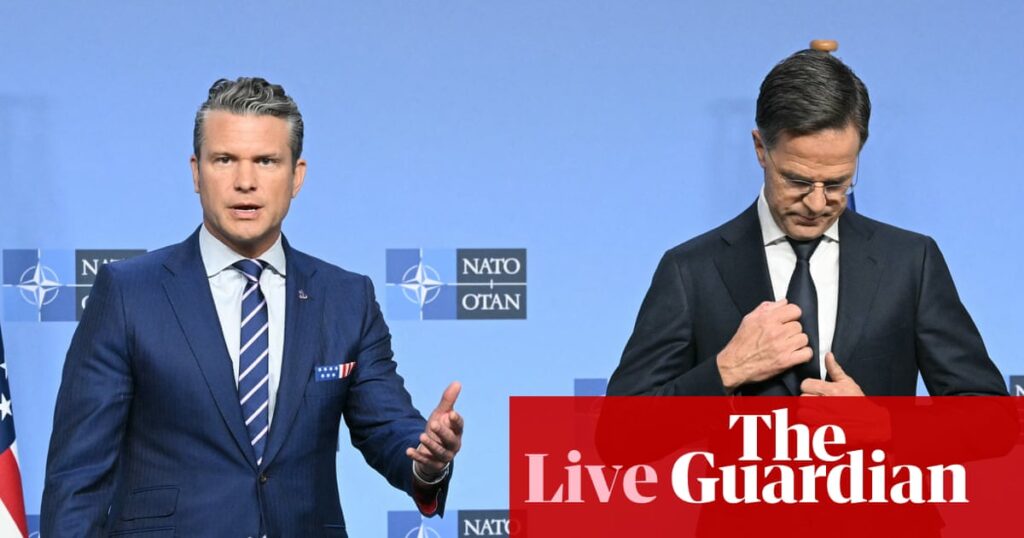Opening summary
Nato defence ministers will look on Wednesday at boosting the alliance’s ability to counter Russian air incursions, as fears grow that Moscow is testing the west in a grey zone between war and peace.
Focus will be on bolstering support for Ukraine as US Defense Secretary Pete Hegseth joins his 31 Nato counterparts with his boss, President Donald Trump, mulling the supply of long-range missiles to Kyiv – after Ukraine president Volodymyr Zelenskyy confirmed that he would be meeting with Trump in Washington on Friday to discuss supplying Ukraine with Tomahawk missiles.
Hegseth said on Wednesday the US expects countries to invest more into the Prioritized Ukraine Requirements List (PURL) arms initiative for Ukraine.
The gathering in Brussels comes after Moscow rattled Nato with a series of high-profile airspace violations in Poland and Estonia that fuelled fears of conflict spilling over its border.
Dutch defence minister Ruben Brekelmans said Nato needs to learn from the drone incursions find a more efficient way to down them than using F-35 fighting jets.
He added that his country plans to spend €90m ($104.6m) in drones for Ukraine. Estonia’s defence minister Hanno Pevkur said his country would be contributing $12m to the fourth PURL package, called the Baltic Nordic package.
The pledges of support come after Russia struck a thermal power plant in Ukraine overnight, gas firm Naftogaz said on Wednesday, without identifying the plant.
The company said in a statement that Russia had also targeted gas production facilities in eastern Kharkiv region and gas infrastructure in the Sumy and Chernihiv regions over the past week.
Meanwhile, Russia’s largest petrochemical complexes in the southern Bashkortostan region is working normally after attacks by Ukrainian drones, the regional governor said on Wednesday.
Radiy Khabirov said the Gazprom Neftekhim Salavat site had come under multiple attacks by Ukrainian drones.
“Their consequences were quickly eliminated. The plant is operating normally,” he wrote on Telegram.
In other developments:
-
Russia will continue to be a major threat to Nato after the war in Ukraine ends, Finland’s defence minister Antti Hakkanen told reporters on Wednesday, adding that they had seen a new build-up of Russian forces. Hakkanen, speaking before the meeting of Nato defence ministers, also said Russia is consuming military resources at a rapid pace and is becoming increasingly reliant on China.
-
Swedish defence minister Pal Jonson said on Wednesday that his country stands ready to make fresh contributions to the PURL arms initiative and called on other countries to continue to step up their assistance to Ukraine. “We’ve been seeing the wrong trajectory when it comes to support to Ukraine. That has been going down. We want to see more stepping up to enhance and increase the financial support and military donations to Ukraine,” Jonson said ahead of the meeting of Nato defence ministers held in Brussels
-
Britain’s defence secretary John Healy said on Wednesday his country’s jets will keep flying over Poland until the end of this year as British commitment to Eastern sentry mission is extended. “We are also ramping up our drone production for Ukraine,” he told reporters before attending a meeting of Nato defence ministers in Brussels.
-
Local authorities in Ukraine ordered the evacuation of families from dozens of villages on Tuesday near the all-but-destroyed north-eastern city of Kupiansk, citing the “worsening security situation”, in a region that has faced heavy Russian attacks. Oleh Syniehubov, governor of north-eastern Kharkiv region, wrote on Telegram that a total of 409 families with 601 children were told to leave 27 localities.
-
Ukraine’s energy provider on Tuesday said it had implemented power cuts in eight of the country’s regions after damage to energy infrastructure after Russian strikes. “Due to the difficult situation in the energy system caused by previous Russian attacks – in Sumy, Kharkiv, Poltava, Dnipropetrovsk, as well as partially in Kirovograd, Kyiv and Cherkasy regions – emergency shutdowns have been implemented,” Ukrenergo said in a statement.
-
Ukrainian President Volodymyr Zelenskyy on Tuesday revoked the citizenship of Odesa’s mayor on the grounds that he also had a Russian passport, acting to end the tenure of a divisive figure who has run the Black Sea port city for 11 years. Hennadiy Trukhanov, 60, an elected official, said he would take his case to court, denying having a Russian passport and insisting that he remained mayor. Ukrainian officials are prohibited from holding dual citizenship.
-
France’s prime minister, Sébastien Lecornu, has suspended Emmanuel Macron’s flagship 2023 pension overhaul until after the 2027 presidential election in the hope of winning over enough Socialist deputies to survive a no-confidence vote. In a welcome respite for the embattled French president, the left-leaning party, which holds the balance of power in a deeply divided parliament, suggested in response on Tuesday that it would not back any of the no-confidence motions to be voted on later this week.
Key events
The Ukrainian military said it clashed with Russian troops in 182 combat engagements on Tuesday, with most attacks occurring around Pokrovsk in the Donetsk province.
The General Staff of the Armed Forces of Ukraine said on Facebook on Wednesday morning that Russia had carried out a missile strike with a rocket, 101 airstrikes dropping 225 guided bombs and 4,429 artillery strikes.
The country also reortedly launched 5,256 drones at Ukraine.
Targets in Ukraine included Novoandriivka, Orikhiv, Novodanylivka in the Zaporizhzhia region and Olhivka in the Kherson region. In Pokrovsk, 69 attacks were recorded.

Kate Connolly
Kate Connolly is the Guardian’s Berlin correspondent
Germans who continue in the labour market beyond retirement age will be able to earn up to €2,000 (£1,750) a month tax-free on top of their pension under a scheme aimed at boosting economic growth and labour force participation rates.
The “Aktivrente”, or active pension scheme, due to come into force in January, was promised on the campaign trail by the chancellor, Friedrich Merz, before he came into office five months ago.
The government, a coalition of Merz’s conservative Christian Democrats (CDU) and junior partners the Social Democrats (SPD), hopes the plan will incentivise post-retirement working.
A draft law is expected to be approved by the cabinet on Wednesday – after Merz won over his Social Democrat sceptics earlier this month – then debated in the Bundestag.
Merz has described the measure as an attempt to take the bull by the horns after three years of economic stagnation exacerbated by a lack of skilled labour, itself a consequence of a chronic demographic crisis. Fewer Germans are being born and increasing numbers are entering retirement. About 9% of the workforce – 4.8 million people – are due to retire in the next decade.
You can read the full piece from Kate Connolly here: German retirees who continue working set to earn €2,000 a month tax-free
Senior Ukrainian officials visiting the United States said Wednesday that they met with representatives of US weapon manufacturers, including Raytheon, which produces Tomahawk missiles that Washington could provide to Kyiv, Agence France-Presse (AFP) reports.
The Ukrainian delegation’s two-day visit also included talks with senior US officials and comes ahead of a planned meeting between US President Donald Trump and Ukrainian leader Volodymyr Zelenskyy on Friday.
Andriy Yermak, the head of the presidential office, said that he had met with representatives of Lockheed Martin and Raytheon alongside other members of the delegation, including Ukrainian Yulia Svyrydenko.
Raytheon produces the long-range Tomahawk missiles that Trump has mulled sending to Kyiv.
Russia, which invaded Ukraine in February 2022, has warned that sending the missiles to Ukraine would rupture its ties with Washington and trigger a new round of escalation.
“Our cooperation continues to grow,” Yermak wrote on social media, touting US-designed F-16 fighter jets supplied to Ukraine by European countries last year.
Ukraine has been pushing for deeper cooperation with allies on weapons production, particularly since Trump took office earlier this year after vowing reduced US support for Kyiv.
Svyrydenko earlier said she had met with US treasury secretary Scott Bessent and discussed joint investment and cooperation on energy issues.
Spain is a reliable member of Nato and currently has 3,000 soldiers deployed under the alliance, Spanish foreign minister José Manuel Albares said on Wednesday in response to US president Donald Trump questioning the country’s defence spending, Reuters reports.
Albares told reporters during a visit to Hangzhou, China:
There is no doubt about Spain’s commitment and contribution to (transatlantic) security.
President Donald Trump on Tuesday threatened trade penalties, including tariffs, against Spain, saying he is unhappy with its refusal to raise defence spending to 5% and calling the move disrespectful to Nato.
Trump told reporters at the White House:
I’m very unhappy with Spain. They’re the only country that didn’t raise their number up to 5% … so I’m not happy with Spain.
I was thinking of giving them trade punishment through tariffs because of what they did, and I think I may do that.
Trump has repeatedly pushed Nato members to spend more on their own defence and cast doubt on Washington’s willingness to come to the aid of members who do not spend enough.
He said last week while meeting Finland’s president that Nato should consider throwing Spain out of the alliance over its refusal to agree to the new commitment.
Spain was the only member of the 32-nation alliance not to commit to increasing military spending to 5% of GDP.
Spanish prime minister Pedro Sánchez secured a last-minute exemption at the time, saying Spain would only spend up to 2.1%, which he called “sufficient and realistic.”

Jennifer Rankin
The EU executive will propose rules to tackle the “huge problem” of short-term rentals via platforms such as Airbnb and Booking.com, as it seeks to confront the “social crisis” of people struggling to afford a home, its first-ever housing commissioner has said.
In an interview with the Guardian and other European newspapers, Dan Jørgensen said it was time for Brussels policymakers to take housing seriously or cede ground to anti-EU populists, who, he said, did not have the answers to the shortage of affordable homes.
“If we don’t, as policymakers, take this problem seriously and acknowledge that this is a social problem and needs action, then … the anti-EU populists will win,” he said, adding that Brussels had so far “failed to deliver” on some of the key elements of the housing crisis.
Jørgensen, a Danish Social Democrat, has been tasked with crafting the EU’s first-ever affordable housing plan, which is expected to be made public in December. He said publication had been brought forward from 2026, citing the urgency of “the social crisis”.
Brussels has traditionally stayed out of housing policy, but Jørgensen insisted it was a matter for the EU. “The upcoming housing plan will cover areas where it is indeed very clear that [housing] is a European competence and where we have failed to deliver so far … One of those areas is short-term rentals, where we do need more European rules,” he said.
You can read the full piece from Jennifer Rankin here: EU executive to propose short-term rental rules to tackle ‘social crisis’ in housing
Russia on Wednesday pushed back at US president Donald Trump’s warning that gasoline shortages showed Russia’s economy was nearing collapse, Reuters reports.
Trump on Tuesday expressed disappointment with president Vladimir Putin, whom he said was unwilling to put an end to the conflict in Ukraine.
Russian deputy prime minister Alexander Novak said that there was a stable domestic market supply of gasoline in Russia.
Novak said:
We have a stable domestic market supply, we see no problems in this regard
The balance is maintained between production and consumption, and we, on the part of the government and the relevant ministries, are doing everything to ensure that this remains the case.
Ukraine hit by fresh power cuts after Russian strikes
Russia struck Ukrainian power infrastructure with drones overnight, knocking out electricity supplies in several areas including in the central Dnipropetrovsk region, the Ukrainian Energy Ministry said on Wednesday, Reuters reports.
Power grid operator Ukrenergo said power supplies were limited in seven regions, most in the east. State-run gas firm Naftogaz said a thermal power plant had been hit, without identifying the plant.
Russia has sharply increased the number and intensity of attacks on the Ukrainian energy system in recent weeks, targeting power plants and gas facilities.
In a report, Naftogaz said the Russians had attacked gas facilities three times over the past seven days, including “critically important facilities” in the Kharkiv, Sumy and Chernihiv regions.
Ukrainian energy minister Svitlana Hrynchuk said earlier this month that Ukraine wanted to increase its gas imports by 30% following Russian airstrikes on its gas infrastructure.
Opening summary
Nato defence ministers will look on Wednesday at boosting the alliance’s ability to counter Russian air incursions, as fears grow that Moscow is testing the west in a grey zone between war and peace.
Focus will be on bolstering support for Ukraine as US Defense Secretary Pete Hegseth joins his 31 Nato counterparts with his boss, President Donald Trump, mulling the supply of long-range missiles to Kyiv – after Ukraine president Volodymyr Zelenskyy confirmed that he would be meeting with Trump in Washington on Friday to discuss supplying Ukraine with Tomahawk missiles.
Hegseth said on Wednesday the US expects countries to invest more into the Prioritized Ukraine Requirements List (PURL) arms initiative for Ukraine.
The gathering in Brussels comes after Moscow rattled Nato with a series of high-profile airspace violations in Poland and Estonia that fuelled fears of conflict spilling over its border.
Dutch defence minister Ruben Brekelmans said Nato needs to learn from the drone incursions find a more efficient way to down them than using F-35 fighting jets.
He added that his country plans to spend €90m ($104.6m) in drones for Ukraine. Estonia’s defence minister Hanno Pevkur said his country would be contributing $12m to the fourth PURL package, called the Baltic Nordic package.
The pledges of support come after Russia struck a thermal power plant in Ukraine overnight, gas firm Naftogaz said on Wednesday, without identifying the plant.
The company said in a statement that Russia had also targeted gas production facilities in eastern Kharkiv region and gas infrastructure in the Sumy and Chernihiv regions over the past week.
Meanwhile, Russia’s largest petrochemical complexes in the southern Bashkortostan region is working normally after attacks by Ukrainian drones, the regional governor said on Wednesday.
Radiy Khabirov said the Gazprom Neftekhim Salavat site had come under multiple attacks by Ukrainian drones.
“Their consequences were quickly eliminated. The plant is operating normally,” he wrote on Telegram.
In other developments:
-
Russia will continue to be a major threat to Nato after the war in Ukraine ends, Finland’s defence minister Antti Hakkanen told reporters on Wednesday, adding that they had seen a new build-up of Russian forces. Hakkanen, speaking before the meeting of Nato defence ministers, also said Russia is consuming military resources at a rapid pace and is becoming increasingly reliant on China.
-
Swedish defence minister Pal Jonson said on Wednesday that his country stands ready to make fresh contributions to the PURL arms initiative and called on other countries to continue to step up their assistance to Ukraine. “We’ve been seeing the wrong trajectory when it comes to support to Ukraine. That has been going down. We want to see more stepping up to enhance and increase the financial support and military donations to Ukraine,” Jonson said ahead of the meeting of Nato defence ministers held in Brussels
-
Britain’s defence secretary John Healy said on Wednesday his country’s jets will keep flying over Poland until the end of this year as British commitment to Eastern sentry mission is extended. “We are also ramping up our drone production for Ukraine,” he told reporters before attending a meeting of Nato defence ministers in Brussels.
-
Local authorities in Ukraine ordered the evacuation of families from dozens of villages on Tuesday near the all-but-destroyed north-eastern city of Kupiansk, citing the “worsening security situation”, in a region that has faced heavy Russian attacks. Oleh Syniehubov, governor of north-eastern Kharkiv region, wrote on Telegram that a total of 409 families with 601 children were told to leave 27 localities.
-
Ukraine’s energy provider on Tuesday said it had implemented power cuts in eight of the country’s regions after damage to energy infrastructure after Russian strikes. “Due to the difficult situation in the energy system caused by previous Russian attacks – in Sumy, Kharkiv, Poltava, Dnipropetrovsk, as well as partially in Kirovograd, Kyiv and Cherkasy regions – emergency shutdowns have been implemented,” Ukrenergo said in a statement.
-
Ukrainian President Volodymyr Zelenskyy on Tuesday revoked the citizenship of Odesa’s mayor on the grounds that he also had a Russian passport, acting to end the tenure of a divisive figure who has run the Black Sea port city for 11 years. Hennadiy Trukhanov, 60, an elected official, said he would take his case to court, denying having a Russian passport and insisting that he remained mayor. Ukrainian officials are prohibited from holding dual citizenship.
-
France’s prime minister, Sébastien Lecornu, has suspended Emmanuel Macron’s flagship 2023 pension overhaul until after the 2027 presidential election in the hope of winning over enough Socialist deputies to survive a no-confidence vote. In a welcome respite for the embattled French president, the left-leaning party, which holds the balance of power in a deeply divided parliament, suggested in response on Tuesday that it would not back any of the no-confidence motions to be voted on later this week.

